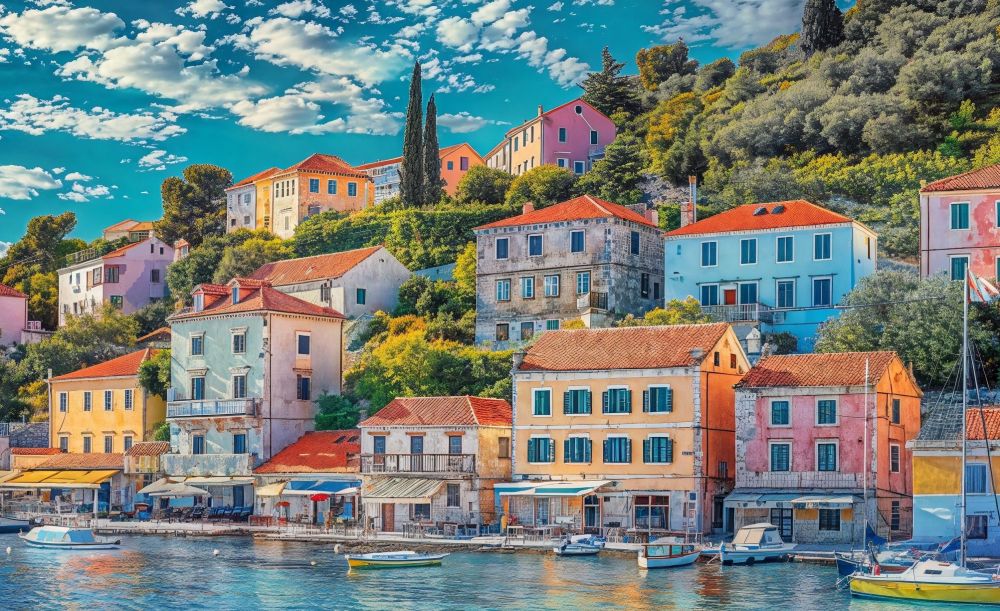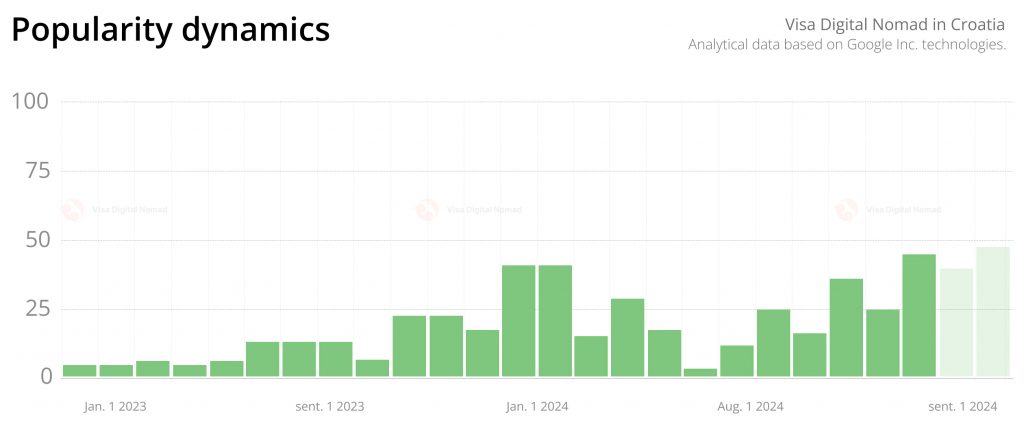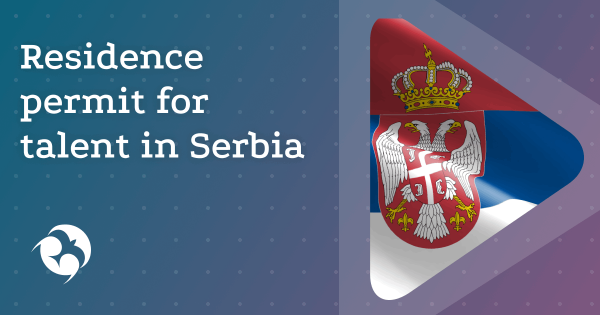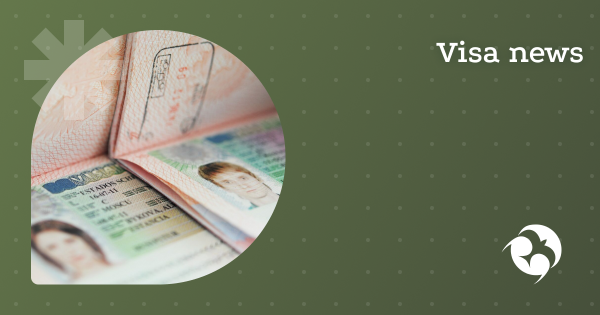In early 2021, Croatian authorities introduced the digital nomad visa at the legislative level. The initiator of the program, which allows foreign freelancers to work remotely within the Balkan state, was entrepreneur Jan de Jong. He personally wrote a letter to the Croatian Prime Minister requesting the possibility of implementing a nomad visa in the country. Initially, the idea gained support from over 450,000 users on the social network LinkedIn.
Today, Croatia offers one of the most competitive service packages for the self-employed, reflected in relaxed income level requirements for applicants. Additionally, holders of the freelancer visa are granted significant tax benefits.
The Consular Section of the Croatian Embassy in Moscow (located at Ostozhenka Street, 23) handles the visa issuance. After crossing the border of the Balkan state, freelancers must visit the local Ministry of Interior (MUP) office to obtain a biometric residence permit.
Freelance Visa Specifics
The digital nomad visa is issued to applicants from non-EU countries. Americans and Swiss nationals are also allowed to work remotely in Croatia. A mandatory requirement for Russians wishing to obtain the freelancer visa is to have an employment contract with an employer registered outside of Croatia. Remote workers are prohibited from being employed by local companies.
The nomad visa, which provides a residence permit for freelancers, is issued for one year and can only be extended six months after the document’s expiration. During the waiting period, the self-employed are not allowed to stay in the Balkan state.
Visa holders may stay in Croatia long-term with family members (spouses, parents, children) or a business partner. However, this preference automatically increases the financial support requirement that the applicant must meet (+10% per person). If a self-employed person moves to work in Croatia without family and business partners, the minimum amount of financial guarantees required today is 2,870 euros per month. If the applicant plans to bring a spouse and two children, the minimum financial support required would be 3,731 euros (2,870 + 30%).
If there is no monthly income, the applicant for the nomad visa can confirm financial guarantees with a bank deposit for one year (minimum amount – 34,400 euros).
Taxes for Freelancers
One of the definite advantages for the self-employed in Croatia is the exemption from paying income tax. A 0% rate is maintained regardless of how many days the foreign guest stays and works as a freelancer in the Balkan state. However, nomads are not exempt from passive types of tax (e.g., taxes on investment activities).
Tax system for digital nomads, freelancers, the self-employed and sole proprietors
| Tax name | The amount of tax | Note |
| Income tax (for digital nomads) | 0% | The exemption is valid if you have a digital nomad visa and income from outside Croatia. When working with Croatian clients, registration of a legal entity is required. |
| Income tax (for freelancers/sole proprietors) | 20% | For those registered as OBRT (sole proprietors). The progressive scale can reach 30% with high incomes. |
| Social contributions (paramedics and pensions) | 16,5% | Mandatory for registered freelancers and sole proprietors. For OBRT, the minimum fee is 250 €/month. |
| Value added tax (VAT) | 25% (standard) 13%, 5% (preferential) |
Required for turnover over 40,000 €/year. Digital nomads are exempt from VAT on foreign income. |
| Corporate tax (for d.o.o.) | 18% | For legal entities (analogous to LLC). It does not apply to individual entrepreneurs. |
| Capital gains tax | 10% | Is charged on income from investments, dividends and royalties. |
| Municipal taxes | Up to 1,5% | Depends on the region of residence. They include fees for local infrastructure. |
Cost of the Visa
The fee for processing the digital nomad visa application at the Croatian Embassy’s Consular Section is set at 93 euros. If the applicant processes the entry permit through a Visa Center (VC), an additional service fee of 27 euros is payable (+ 6 euros logistics fee if documents are submitted to regional VCs). Visa and service fees are waived for children (up to 6 years old) and disabled individuals of all groups (including one accompanying person).
In the table below, we have written what expenses are expected when applying for a digital nomad visa to Croatia.
| Fees, duties and other expenses for obtaining a visa | Cost |
| Visa processing fee | 93 € |
| Rental housing | 400€-700€ |
| Full support of visa processing | from 1500 € |
Additionally, you need to take into account the cost of air travel to Croatia from your place of stay, as well as the cost of translating documents.
Required Documents
To obtain an entry permit, a freelancer needs:
- An application form;
- Civil passport;
- International passport;
- A 3.5 x 4.5 cm color photo (1 copy);
- An employment contract with an employer registered outside of Croatia;
- Rental agreement;
- Certificate of no criminal record;
- Bank statement showing funds (deposit not less than 2.5 average monthly salaries established in Croatia for the previous year, or a minimum income amount for the last 12 months – 34,400 euros);
- Medical insurance with coverage of at least 30,000 euros;
- Biometric data;
- Consent for processing personal data.
Documents must be translated into Croatian or English (with notarial certification).

- We will answer all your questions
- We will help you choose the best option
- We will guide you through every step or do everything for you
Recent Changes in Visa Issues with Croatia
Despite the fact that Croatian authorities predominantly approve applications for short-term stays, from February to March 2024, the percentage of wanting to apply for the nomad visa remains consistently high.
According to Google Trends statistics, after a slight decline in interest at the beginning of the 3rd quarter of 2024, the demand for a digital nomad visa to Croatia began to reach new record levels.
Frequently Asked Questions
The validity period of the passport must be at least 3 months longer than the end date of the intended stay in Croatia. For example, if you plan to spend a year in the country (the maximum period of validity of a visa), then your passport must be valid for at least 15 months from the date of application. Also, the passport must have at least two free pages for the visa.
Medical insurance must cover the entire period of stay in Croatia, be issued by a company that has the right to work in the country, and include coverage of basic medical expenses. Insurance can be both tourist and private, the main thing is compliance with the specified requirements.
The policy must cover the entire stay and include expenses of at least 30,000€. Annual insurance costs 500-1,200€ depending on the coverage. When applying through Croatian insurance brokers, the cost increases by 15-20% due to fees.
The documents must be submitted in English or Croatian. If the originals are in another language, a notarized translation in Russia or a translation performed by an authorized (sworn) translator in Croatia is required. However, an apostille for translations is not required.
There are 3 ways to submit documents. Online via the official website of the Croatian Interior Ministry (all documents must be scanned in PDF format). Through the consulate or visa application center in the country of residence (especially if a visa is required to enter Croatia). Personally at the police station in the Republic (if the applicant is already in the country). Each method has its own characteristics, but requires the same set of documents.
After entering Croatia (which must be done within 30 days of visa approval), you must register at your place of residence at the local police department (MUP) within 3 days. To do this, you must fill out Form 8a (Obrazac 8a), provide proof of housing (rental agreement, hotel reservation), the presence of the landlord or notarized documents.
After the approval of the visa and entry into the country, if you plan to stay for more than 3 months, you must issue a resident’s biometric card. This requires providing biometric data at the police station, paying fees (about €31.85 for the standard procedure or €59.73 for the expedited one), paying an administrative fee of about €9.29, and providing payment receipts.
The standard period for reviewing documents is from 30 to 45 business days from the date of submission of the full package. In exceptional cases, when the consular services are heavily loaded, the period may be extended up to 2 months. Online applications are processed as a priority, but no faster than 4 weeks.
The applicant must cross the Croatian border within 30 calendar days from the date of visa issuance. Missing this deadline leads to the cancellation of the permit. The period of stay starts from the moment of the first entry, and not from the date of issue of the document.
After entering the country, you must register your residence address with the local police department (MUP) within 3 business days. Violation of this rule entails a fine from 200 to 2,000euros. Form 8a is provided for registration, which can be completed in advance or on the spot.
The procedure for obtaining an ID card takes 10-15 business days from the moment of submitting the documents to the police station. Accelerated processing for an additional fee (€59.73) reduces the time to 5 days. The card is issued in person upon presentation of a passport with a visa.
Yes, but each family member will need a 10% increase in the financial threshold, separate medical insurance (+300-500 €/year), and a notarized translation of marriage/birth certificates (40-80€ per document). Consideration of applications for relatives takes 10-14 days longer.
Nomad’s family members can obtain a family reunification visa. This will require a certificate of no criminal record (for adult family members), medical insurance similar to the main applicant, documents confirming kinship with the main applicant, and an increase in the required financial threshold by 10% for each family member.
For family reunification, the application is submitted at the same time as the main applicant. The examination of relatives’ documents takes 10-14 days longer due to the need for additional checks. Children over the age of 12 undergo separate biometric registration within 7 days of entry.
Visa holders are required to spend at least 10 months a year in the country. One-time check-out is allowed for up to 30 consecutive days. The total absence is no more than 60 days per year. Exceeding the specified limits leads to the cancellation of the status.
In case of a negative decision, re-filing is allowed after 90 days from the date of receipt of the official notification. During this period, it is necessary to eliminate the reasons for the refusal indicated in the motivated response of the consulate. The appeal is filed within 15 working days through the Croatian Ministry of the Interior.
The main mandatory payments include a consular fee of € 100 for reviewing the application, an administrative fee for issuing a resident’s biometric card (€31.85 standard term or €59.73 accelerated option). The fee for a temporary residence permit is €9.29, payable when submitting documents at the police department. The total amount of official payments is 141.14–168.98€ excluding additional services.
A rental agreement is required to confirm the residential address. Average prices vary as follows. 400-700 €/month on the coast (Dubrovnik, Split). 250-450 €/month in the continental regions (Zagreb, Varazdin). Many landlords require payment for 3 months in advance, which increases the initial cost to 750-2,100€.
Upon arrival in Croatia, you must submit an application to the local police station with a passport and a rental agreement, submit fingerprints and a photo for biometrics, pay an administrative fee (€31.85), and receive a card in 10-15 business days. The accelerated procedure (5 days) is available for €59.73.
Digital nomads are exempt from paying taxes on income earned outside Croatia. However, when working with Croatian clients, registration of a legal entity and payment of 20% income tax + 16.5% social contributions are required.
Certificate of absence of criminal record – 3 months from the date of issue. Bank statement – 30 days to confirm the current balance. The rental agreement must cover a minimum of 6 months of stay. Overdue documents lead to rejection in 85% of cases.



















